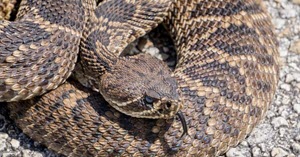Wildland & Snake Safety
Ensure Safety of Your Valuable Wildland
It’s important to remember that we live in a delicate, diverse, fragile, and fire-prone region of our state, country, and planet. If you own or rent property or a business on wildland areas in Ventura County, it’s especially important that you take the proper precautions to guard against wildfires or any other natural disasters. Here are some helpful tips for wildland safety:
- Prepare a “preplan” for dealing with disasters and wildfires. Practice an escape route from your home and neighborhood.
- Designate an emergency meeting place for your family members and establish a contact point to communicate with concerned relatives
- Build or re-roof your structure with fire-resistant roofing materials
- Clear pine needles, leaves, dead branches, and other debris from your roof, gutters, and overhang areas
- Remove any tree branches within 10 feet of your chimney—and cover your chimney outlet and stovepipe with a non-flammable mesh screen of no more than 1.5 inches
- Build or remodel your home with fire-resistant materials like brick or stucco
- Enclose the underside of balconies or ground decks with fire-resistant materials
- Limit the number of windows facing large vegetation areas—and install double- or triple-pane windows to reduce potential breakage
- If a brush fire threatens, place a lawn sprinkler or garden hose on the roof—and do not turn water on until you see embers falling on the roof
- If a brush fire threatens, place all ladders against the street-side of your home
- Create and maintain a “defensible space” by removing all dry grass, brush, and dead leaves at least 100 feet from structures. Use fire-resistant landscaping plants.
- Trees taller than 18 feet can be pruned to keep ground fires from spreading to treetops. Prune the lower branches within 6 feet of the ground.
- Stack firewood and scrap wood piles at least 30 feet away from structures. Clear flammable vegetation that’s within 10 feet of wood piles.
- Locate LPG tanks (butane and Propane) away from any combustibles.
- Turn off gas at the meter—or turn off LPG tanks before you evacuate
- Mark all emergency water sources and maintain easy firefighter access to them
- If your water comes from a well, consider an emergency generator to operate the pump during power failure
- Be familiar with at least two exit routes from your neighborhood in case of emergency evacuation
- Ensure that any road leading up to your house allows two-way traffic, is not too steep and does not have curves too sharp to accommodate large emergency vehicles
- Driveways and bridges must be strong enough to carry heavy emergency vehicles, including bulldozers carried on large trucks
- Make sure dead-end roads and long driveways have turnaround areas wide enough for emergency vehicles
- Your house address and street name should be printed in numbers and letters at least four inches tall, on a contrasting color background. Signage should be visible from all directions from at least 150 feet. If your house is set back from your street or road, post your address at the entrance to your driveway.
- Store at least a three-day supply of drinking water for you and any pets or livestock. Store food that does not require refrigeration and generally does not need cooking,
- Store first aid supplies, portable radio, flashlight, emergency cooking equipment, portable lanterns, and batteries
- Prepare a list of valuables to take with you in case of evacuation. If possible, store these valuables together to save time.
- Nail plywood covers over windows and vents when a brush fire threatens you home.
- Move any lawn furniture indoors and keep combustible furniture away from windows
- Turn on lights in the house, porch, garage, and yard so firefighters can find your home
- Park your car in the garage headed out for a quick getaway if needed. Leave keys in the ignition. If you lack a garage space, park vehicles in the direction of escape.
- Close all house doors, windows, and garage door—but leave them unlocked
- Remove lightweight curtains and close heavy drapes and blinds before leaving
- Close all windows so that airborne sparks and embers cannot enter and ignite the upholstery of the vehicle
Snakes Alive!
The wildlife ecosystem of Ventura County is diverse and multi-faceted. Snakes play an integral role in this ecosystem, and are typically no threat to humans. When cornered, threatened, or surprised, snakes can attack—and some species, like the southern pacific rattlesnake, are venomous. Be sure to take caution when encountering snakes in or around your property or exploring the great outdoors. Here are some helpful tips.
 Watch where and how you step
Watch where and how you step - Wear closed-toe shoes or boots while hiking
- Stay on hiking trails at all times
- Keep your pets on a leash at all times
- If you encounter a snake, leave it alone—and back away slowly
- Never pick up a snake—venomous or non-venomous
- Do not kill snakes, as they serve a valuable role in our environment
- Be especially aware of snakes during warm weather
- Discourage snakes in your yard by cautiously removing debris
- Be careful entering cool, dark areas, where snakes typically live
- Be sure all your windows and doors close tightly to prevent snake entry
- Keep your doors closed during warm days and months
- If a snake will not leave your property, call VCFD for removal—and observe it until VCFD personnel arrive
First Aid for Snake Bites
If you or someone else are unable to avoid an encounter with a snake and it bites you, stay calm and immediately follow these precise steps:
- Move the snake bite victim to a safe area
- Quiet and calm the victim to slow down blood circulation
- Transport the victim to a medical facility or call 911 right away
- Elevate the site of the bite wound
- Do not cut the wound, apply ice, or use a tourniquet
- Do not attempt to capture, kill, or restrain the snake
For additional snake-related tips, visit the Department of Fish and Wildlife (CDFW) website.


